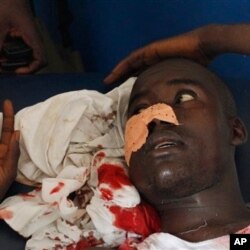The New York-based Committee to protect Journalists [CPJ] says both sides are using media outlets allied with them to disseminate their political message.
Media houses have been used to inflame passions and win the hearts of civilians in both the south and the rebel-controlled north, says Mohamed Keita, the CPJ Africa advocacy coordinator. He says they have inadvertently become partisan players in the conflict and are constantly targeted by rival militias and supporters of the presidential rivals.
Thirty people were killed recently when they marched on the offices of the state-controlled television station to demand the resignation of its director.
Keita says his organization is still concerned about the fates of jailed journalists Aboubacar Sanogo and Yayoro Charles Lopez Kangbé of rebel-controlled station TV Notre Patrie who, he says, have spent 20 days in military custody without charge.
“It is becoming unbearably dangerous for media outlets and their journalists to operate in Ivory Coast,” says Keita. He calls on both sides to “refrain from targeting the press or using politically motivated censorship.”
Last week, the National Press Council, the official regulatory body for the country’s print media, suspended Le Nouveau Réveil newspaper for being pro-Ouattara. It criticized the paper for publishing graphic photos of protesters killed by government forces.
According to the CPJ, other papers that published the photos, including the pro-Ouattara dailies Le Patriote, Nord-Sud and Le Jour Plus, were fined by the National Media council. The publishers were given 30 days to pay.
Keita says, in the “tit-for-tat control for the media,” even government outlets are not safe. Recently, armed militia attacked a broadcast station housing a transmitter of the state Radiodiffusion Télévision Ivoirienne in the Ouattara stronghold of Abobo district in Abidjan.




